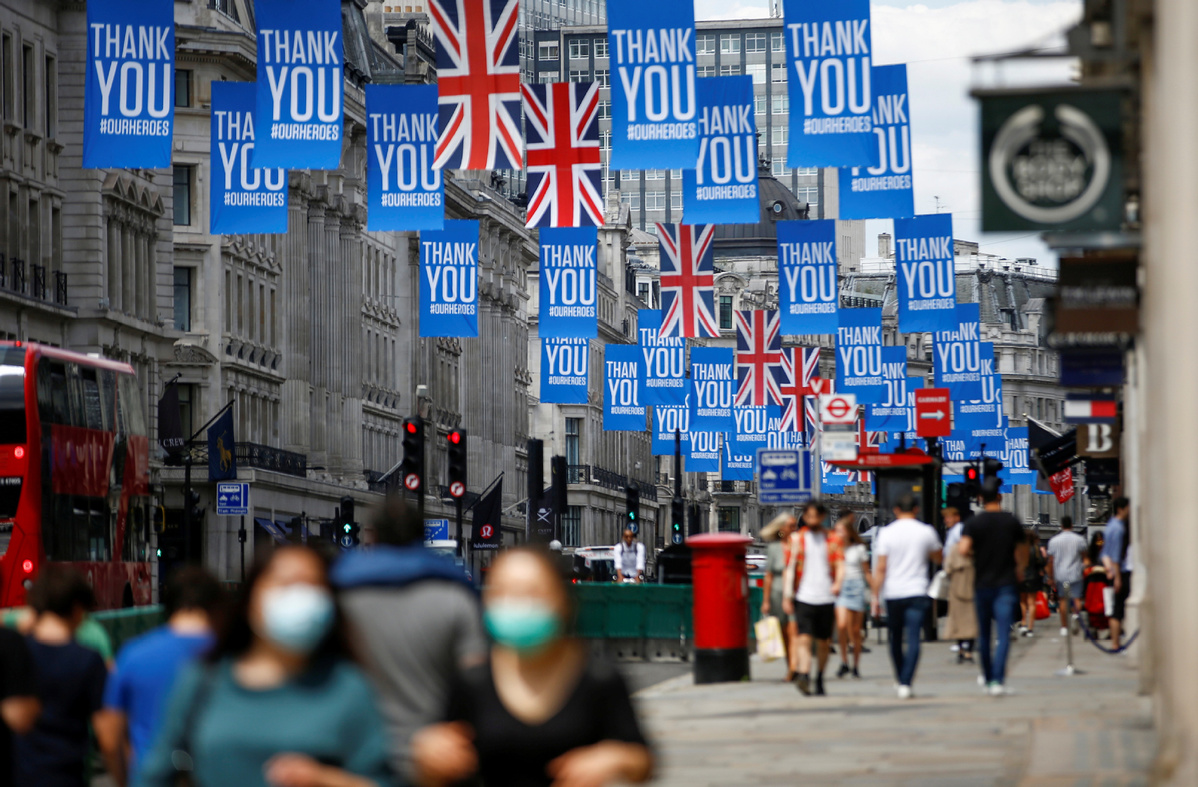UK set to introduce stricter face mask rules
By EARLE GALE | China Daily Global | Updated: 2020-07-13 10:16
The United Kingdom is expected to announce new rules requiring more reliance on face masks as the government ramps up its containment of the novel coronavirus and COVID-19 disease it causes.

Boris Johnson, the nation's prime minister, admitted new rules are on the way when asked about reports of bureaucrats preparing regulations to make face coverings mandatory attire in enclosed public spaces such as shops.
The Financial Times said Johnson, who appeared underwhelmed in the past by the argument in favor of face masks, said during an online question and answer session on Friday that scientific opinion had "shifted more in favor" of them and that the government would respond.
The change followed the Royal Society, Britain's national academy of sciences, publishing two reports last week emphasizing the efficacy of face masks.
"As we get the numbers down in the way that we have and we really stamp out outbreaks in the way that we are, I do think we need to be stricter in insisting people wear face coverings in confined spaces where they are meeting people they don't normally meet," Johnson said.
The Guardian newspaper reported that British virologist Wendy Barclay, head of the infectious diseases department at Imperial College London, had said laboratory studies show infectious novel coronavirus droplets remain in the air for up to an hour, making airborne transmission possible and face masks useful. She said some types of air conditioning may even help spread the virus.
But Michael Gove, a Cabinet minister, walked the government back on Sunday from too much emphasis on face masks by insisting they will not become mandatory in the UK in the way they are in 120 other countries.
He said on the BBC's Andrew Marr Show: "I trust people's good sense … (but) tougher measures could be taken."
Downing Street also clarified on the weekend the government's position on working from home, after a comment from Johnson on Friday suggested he wants all workers to return to their places of employment.
The prime minister's office said guidelines had not changed and that all people who can work from home must continue to do so. His spokesperson told the Guardian newspaper Johnson was merely saying he wants those who cannot work from home and who can safely return to the workplace to do so for the sake of the economy.
Gove, meanwhile, confirmed on Sunday the nation will spend 705 million pounds ($890 million) on reinforcing its borders, something that will allow it to better regulate the movement of people and the spread of the virus as well as ensure it can control the fl ow of goods after its full exit from the European Union at the end of the year.
"With or without further agreement with the EU, this 705 million pounds will ensure that the necessary infrastructure, tech, and border personnel are in place so that our traders and the border industry are able to manage the changes and seize the opportunities as we lay the foundations for the world's most effective and secure border," the BBC quoted him as saying.
Gove added in a column in the Sunday Telegraph newspaper that the UK will introduce a new immigration policy soon "that ensures we're open to the world's best talent". Details will be shared on Monday but Home Secretary Priti Patel told The Sun newspaper it "will scrap the bureaucratic Resident Labour Market Test, lower the skills and salary threshold, and remove the cap on skilled workers".
On the subject of international travel, Nicola Sturgeon, Scotland's first minister, insisted on the weekend she is not planning to introduce quarantine restrictions on travelers arriving from England, where the novel coronavirus infection rate is five times higher than it is in Scotland.
Meanwhile, the European Union is preparing for its first face-to-face meeting of leaders after five months of remote meetings, so negotiations can continue about a potential 750-billion-euro ($850-billion) pandemic recovery fund that several northern nations seem intent on defeating.
The fund, which is supported by the German Chancellor Angela Merkel and French President Emmanuel Macron, would help hard-hit southern nations recover from the economic turmoil caused by the pandemic.
























